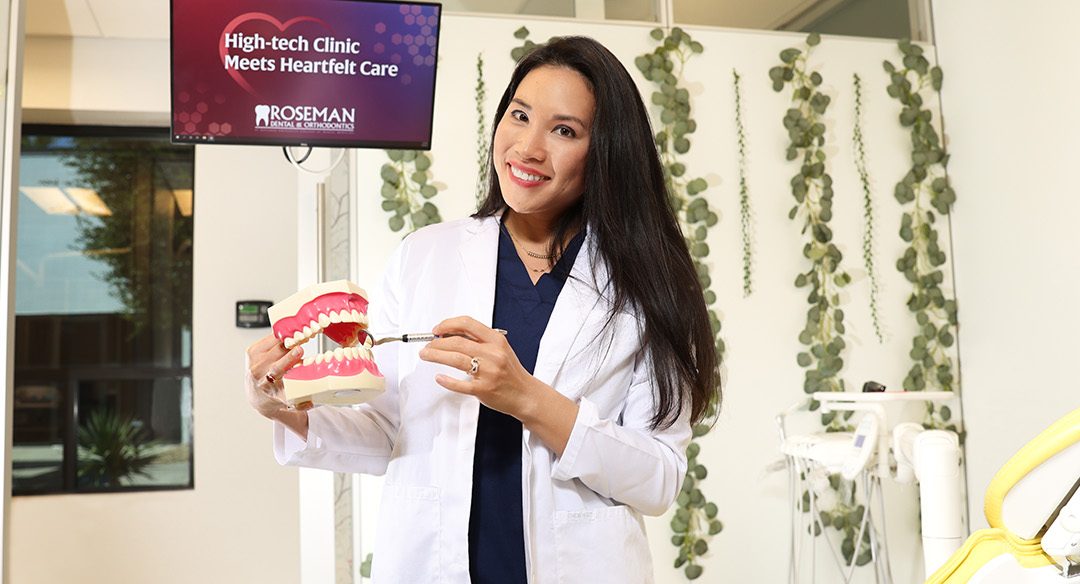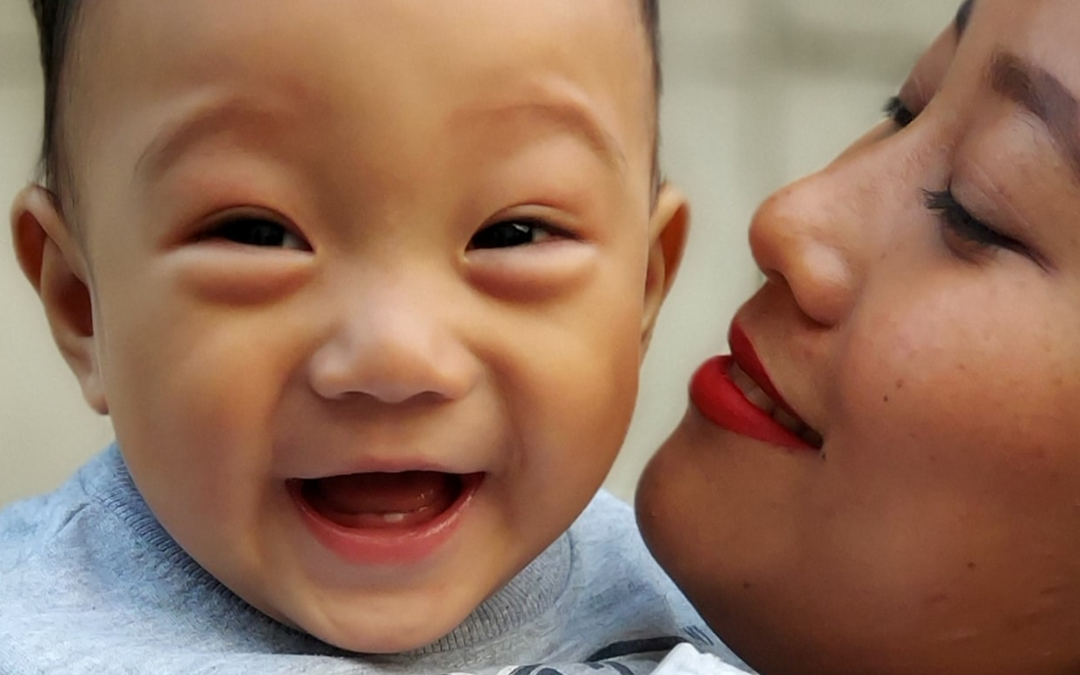
by Roseman Dental | Oct 5, 2022 | Dental Clinic Blog, Oral Health, Roseman Dental - NV, Roseman Dental - UT
Trick-or-treating is the highlight of Halloween for most children, but excessive candy consumption can be harmful to a child’s dental and physical heath. Halloween doesn’t have to be a sugar-laden free-for-all. There are many ways to limit your child’s sugar intake without a making a scary scene.
- Collect Less Candy – Limit the amount of candy your child collects by having her use a smaller treat bag and calling it quits once the bag is filled. You can also set a time limit on her trick-or-treating or visit only houses within a certain walking distance.
- Trade Candy For Cash – Many dentists participate in a candy buyback program. If yours doesn’t, consider forking out some of your own cash in exchange for your kid’s candy, then donate the stash to a local shelter or a branch of the military.
- Plan a Visit From the Candy Fairy – If your child is too young to be interested in cash, consider swapping the loot for a toy they have had their eye on. Instruct your child to leave the goodies in a special location, and make the trade while they are asleep.
- Ration the Goodies – Let your child pick out a few of his favorites on Halloween night, then store the rest out of sight and out of reach. Pack one small piece in his or her lunch each day, or save it to dole out only on special occasions.
- Pass Out An Alternate Treat – You can do your part to limit junk food in your neighborhood by passing out something other than candy. Stock up on stickers, glow sticks or another prize to give away, and encourage your neighbors to do the same.
However you choose to prevent sugar overload this holiday, be sure your child knows what to expect beforehand. Fill her up with a healthy dinner before she begins knocking on doors, and allow a little indulging before the night is over. Have a plan for the rest of the candy, and no matter how late your little ghoul is up, don’t send her to bed without brushing!

by Roseman Dental | Sep 14, 2022 | Dental 360, Dental Clinic Blog, Providers - NV, Roseman Dental - NV
Dr. Chen recently joined Roseman’s College of Dental Medicine as a board-certified Pediatric Dentist at Roseman’s clinics in Henderson and Summerlin, NV. With a warm smile, kind face and gentle way about her, it is immediately obvious that she has a gift for connecting with children. Dr. Chen knew from a young age that she wanted to be a healthcare provider and that she wanted to use her hands in her profession. Shadowing an optometrist and dentist in high school, she connected quickly with the practice of dentistry but she had no particular plans or interest in treating children. Though Dr. Chen is the eldest of two girls in her family, she did not have a great deal of experience with or an affinity towards children, yet she found that her passion for pediatric dentistry grew while in her second year of dental school in Boston. She received her dental degree from Boston University and her specialty training in Pediatric Dentistry at Temple University. Originally from California, Dr. Chen received her bachelor’s degree in Psychology from UCLA with an emphasis in Developmental Psychology. In dental school, Dr. Chen worked alongside caring, compassionate faculty who took a great interest in mentoring her. Through this, she realized how important it was her to not only to provide preventative care, but to also ease pain and discomfort. Dr. Chen was born to parents who guided her not to a specific profession or interest, but toward an ethos, “be helpful and to take care of others.” She has most certainly followed this guidance in her professional life.
After a decade in private practice, in 2021, Dr. Chen made a personal decision to focus more time on the practice of pediatric dentistry and to let go of some of the administrative and business tasks associated with running a practice. When the opportunity arose at Roseman Dental & Orthodontics, it seemed like a perfect fit. “The opportunity at Roseman gave me the chance to place greater focus on doing what I love most—treating children. I couldn’t be happier about the opportunity to work in both of Roseman’s clinics. The entrée into academia also offered her the chance to return some of the goodwill and guidance offered to her by faculty when she was a student. In her new role, Dr. Chen has the chance to shape and inspire future providers.
Roseman Dental & Orthodontics, in addition to providing care to adults and children, is the home of the Advanced Education in General Dentistry (AEGD) residency, which hosts 2 residents per year through a partnership with NYU Lutheran Dental Medicine. These dentists receive advanced training through Roseman Dental & Orthodontics and are exposed to more complex cases. In her position, Dr. Chen is able to work alongside these residents, shaping their experiences and developing patient-centered practitioners while treating children. Roseman Dental & Orthodontics’ dental clinic also refers patients to Roseman Dental & Orthodontics’ ortho clinic, which is at the same address and next door.
Dr. Chen also practices at Roseman’s newest dental family member, Roseman Dental – Summerlin, Roseman’s pediatric dental clinic focused exclusively on treating medically compromised children in need of specialized dental care. Dr. Chen works alongside Dr. Michael Cottam, Clinic Director, to treat patients of Roseman’s partner organization, Cure 4 The Kids (C4K). C4K treats children with cancers, blood diseases and other life-threatening diseases. These children often put their dental needs aside, yet they need a dental home with dentists that work alongside their physicians to deliver what is often specialized care.
Dr. Chen is a beloved healthcare provider in the Nevada community. She brings to Roseman extensive experience, a deep commitment to improving the welfare and health of children, and a warm sense of optimism about her work. Dr. Chen and her husband Dr. Matthew Raddue, an anesthesiologist, enjoy being parents to their two children. Welcome Dr. Chen!

by Roseman Dental | Nov 9, 2021 | Dental Clinic Blog, Oral Health, Roseman Dental - NV, Roseman Dental - UT
If you are the parent of a baby or toddler and your family has successfully made it through the dreaded teething stage, you may be wondering what the next step is in terms of your child’s oral hygiene and care. Dental professionals agree that the sooner a child can see a dentist, the better. This is particularly true when it comes to preventing dental health issues. Periodontal disease and many other dental problems that commonly affect children are more likely to occur in children who do not receive regular dental care and evaluations.
If you’re thinking it’s not that big of a deal because your child will lose those baby teeth anyway, keep in mind that these issues can lead to a broad range of more significant problems down the line, including nutritional problems from trouble eating and drinking, and problems with speech development and self-esteem.
When to Schedule Your Child’s First Dental Visit
According to the American Academy of Pediatric Dentistry (AAPD), infants and toddlers should have an oral evaluation performed within six months of the appearance of his or her first tooth. Because there’s so much variability among children as to when that first tooth erupts, AAPD recommends visiting a dentist for an evaluation before the child’s first birthday even if that first tooth has yet to appear.
Oral Health at Home
While seeing a dentist early on improves your child’s chances of optimal oral health, there are several other things you can do in the comfort of your own home. AAPD recommends avoiding putting children to sleep with a bottle of milk or juice, and not allowing them to sip on a bottle with those things in it throughout the day either. Both actions increase your child’s chance of tooth decay. If your child has trouble falling asleep without a bottle, make sure it contains only water, and try to take it away entirely before your child hits the one-year mark.
Another tip is to gently wipe their gums and teeth with a soft washcloth to remove bacteria, and to start doing this early on so they get used to it. There are also infant “brushes” that go on the finger.
When it comes to your child’s oral health, prevention is paramount. Taking the aforementioned tips and seeing a dentist early on are the best ways to set your child up for healthy teeth and gums. Roseman Dental offers care for even the youngest members of your family.
.
by Roseman Dental | May 11, 2016 | Dental Clinic Blog, Oral Health, Roseman Dental - NV, Roseman Dental - UT
Tooth development begins long before teeth begin to emerge from the gums, and even after the first teeth erupt, babies do not have the ability to clean their own gums and teeth so it is important that parents take steps to help them avoid tooth decay. Unfortunately even in baby food and drinks there can be a lot of sugar so parents should make sure to clean a baby’s gums after every feeding. Here are some tips to keep in mind when it comes to keeping your baby’s gums and teeth healthy.
- After breastfeeding or bottle feeding, clean off the baby’s gums with a moistened piece of gauze or a clean cloth. When babies sleep, their saliva production decreases, making it easier for bacteria to incubate and start the process of decay.
- Once a baby’s teeth start to emerge, cleaning becomes even more important. Use a soft brush meant for babies with water to gently scrub their teeth after every feeding.
- By the time a baby is able to drink out of a cup, they should be weaned away from the bottle and given a cup to drink from. It is important for the development of facial muscles for babies to perform the sucking motion natural for breastfeeding, but after a certain point it can be bad for their teeth.
- When weaning babies off of formula, you can start with a mixture of formula diluted with water. Steadily increase the water-to-formula proportion until they are drinking just water. Water is the only safe liquid to give babies and not have to clean their teeth afterward.
Reasons to Keep Baby Teeth Clean
If bacteria are allowed to grow uninhibited in a baby’s mouth, they can experience painful cavities and other forms of tooth decay; baby teeth with significant problems may require extraction, which can lead to speech impediments and difficulty eating. Their permanent adult teeth may even grow in an irregular way that will necessitate more orthodontic interventions later. Remember that healthy baby teeth will lead to healthy adult teeth, so take care of your child’s dental health until the point when you can get them brushing every night on their own.
by Roseman Dental | Mar 10, 2016 | Dental Clinic Blog, Oral Health, Roseman Dental - NV, Roseman Dental - UT
Oral hygiene is important for people of all ages. Young children, in particular, can benefit from good oral health habits. Setting good habits with your children can improve their overall health and prevent oral problems like cavities and gingivitis, so use these tips to teach children effective habits.
Brush and Floss Daily
Children should understand the importance of brushing and flossing at a young age. These simple activities are the best ways to prevent tooth decay. Regular brushing helps to remove plaque build up on the teeth, while flossing helps remove food and residue that is lodged between the teeth and underneath the gums.
To help your children with brushing and flossing, make sure they have the right tools. You can purchase floss and toothpaste made specifically for children, and parents should help children with brush until the child has the manual dexterity to tie their shoes. Also, make sure to change out their toothbrushes regularly.
Eating a Balanced Diet
Poor eating habits can contribute to oral health problems. It is especially important to limit the amount of starchy and sugary foods your child consumes. These foods can cause plaque to build up on the teeth, and they are one of the main causes of decay. If your child does consume these foods, have them rinse their mouth with water after eating. It is also a good idea to give your children drinking water with fluoride.
Visit the Dentist
Part of establishing good oral hygiene with children involves visiting the dentist. You can schedule regular checkups with the dentist for a thorough cleaning and inspection. It is also important to visit the dentist if your child experiences a mouth injury or loses a tooth.
When you establish good oral health habits, your children will be less likely to develop cavities or gum problems. It is important to implement these tips sooner rather than later because as your children get older, they need to understand and practice good oral hygiene on their own.





